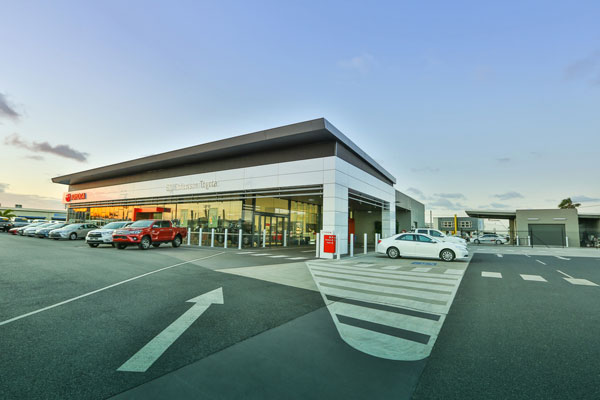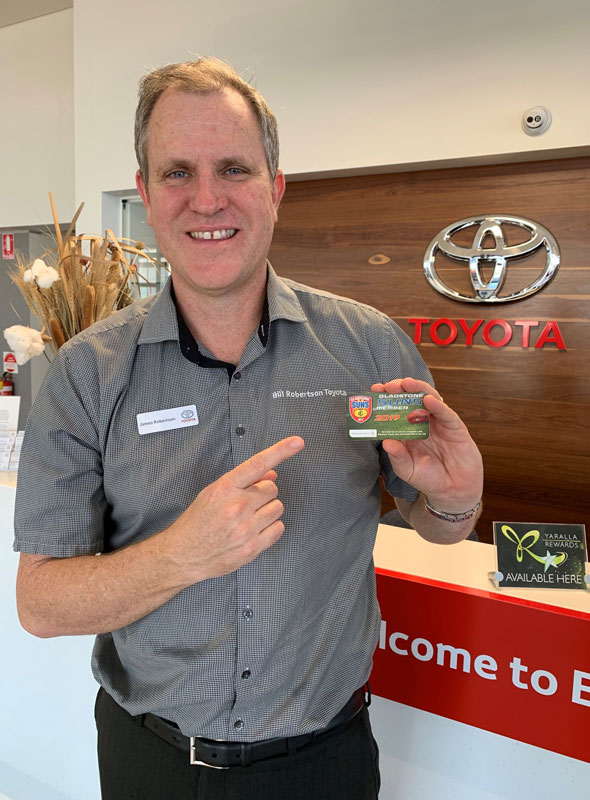Road to Recovery, One Year On | James Robertson – Bill Robertson Toyota
In the June 2020 edition of Motor Trader, we spoke with the owners of four MTA Queensland member businesses from across the State. One year on, we talk to those business owners again to see how they have fared and how they feel about the future today.
Think back to this time last year, and things could hardly have been worse for the new car sector.
The biggest fall in sales had just been recorded – April 2020 figures were a massive 48.5 per cent down from the previous year – and May’s numbers were almost as bad (down 35.3 per cent). According to the Federal Chamber of Automotive Industries (FCAI), May 2020 was the 26th month in a row of ‘negative growth’.
When Motor Trader talked last year with James Robertson, Dealer Principal of Bill Robertson Toyota in Gladstone and chairman of MTA Queensland’s AADA committee, the Gladstone market was down 40 per cent and ‘workshop demand was down a similar amount’.
Things were rough.
However, the difference between then and now for James’ own business and the wider new car sector could not be more stark.
“Business is great,” he said. “2021 year-to-date new vehicle sales in Australia are up 30.7 per cent on 2020, and April 2021 sales were up 137 per cent on April 2020. I haven’t spoken to a dealer that hasn’t enjoyed increased sales and I don’t think anyone could have imagined we would have been this busy during a pandemic.
“There was a great fear our dealerships would become ghost towns, but I think Government stimulus has worked, and dealers are grateful. Our workshops have been busy too and that’s great because workshops employ a lot of people.”
While there is talk about how COVID has changed how people work (from home) and how they shop (online), the COVID exposure for regional Queensland, where cases have been few, has been different to that of the larger towns and cities. And while measures taken to ensure staff and customer safety were put in place at Bill Robertson Toyota and other dealerships, the COVID era will probably not, said James, change the nature of the dealership experience.
“I’m a regional dealer so we have been spared a lot of lockdown disruption. We still have sanitising and social distancing, and I think that will remain for some time. And I think we’ll see more use of zoom meetings and some working from home,” he said. “However, consumers aren’t ready to buy a car online. The transaction is too complicated – there are trade-ins to negotiate, finance applications, accessories, and vehicle features need to be explained. Dealers are great at doing this locally, face to face and in a timely manner. I don’t think COVID will significantly change how dealers operate.”
While regional Queensland may have been less affected by Covid outbreaks, early restrictions did have an impact and the governments’ support for businesses had been welcome.
“We are very fortunate to live in a country that has governments that were able to respond as they did,” said James. “The simplicity with which stimulus was delivered through existing systems such as the Australian Taxation Office was world class.”
Though the turnaround in the fortunes of the new car sector have been spectacular, there are still challenges to tackle. COVID is a global problem, and carmakers work on a global scale. As such, problems overseas impact everyone. The unique challenge for new car dealers is the delays in delivery of vehicles to customers – a problem due in large part to the computer chip shortage that is stinging vehicle manufacturers across the world.
“Many dealers are having to take orders with long delivery time frames,” said James. “We are working to ensure consumers are given realistic time frames of when their orders can be delivered and, fortunately, dealers are getting enough stock each month to keep them going.
“We need to reassure consumers that the best way to get a new vehicle is to place an order. There just isn’t enough stock available at the moment for dealers to have a variety of options.”
However, even given that potentially long-running issue – and the long-term technological evolution of the industry – James is upbeat about the future for the new car sector.
“We will continue to work through what vehicle electrification and technology advancements mean for us, and we will continue to remind government that the dealership model provides consumers with a level or service you just don’t see in other industries,” he said. “We’ve emerged stronger from COVID. The future is positive for AADA (QLD) members.”
Source: Motor Trader e-Magazine (June 2021)
14 June 2021











